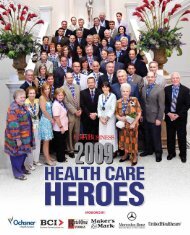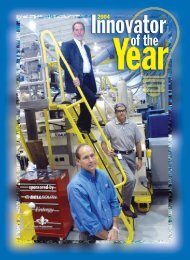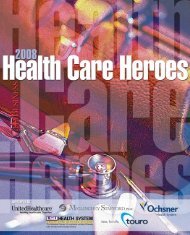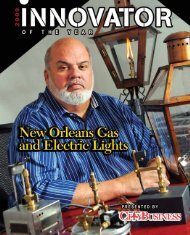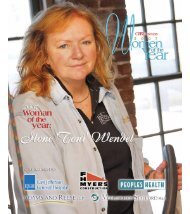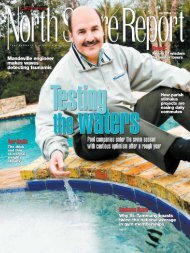INNOVATORS Gold Award - New Orleans City Business
INNOVATORS Gold Award - New Orleans City Business
INNOVATORS Gold Award - New Orleans City Business
- No tags were found...
You also want an ePaper? Increase the reach of your titles
YUMPU automatically turns print PDFs into web optimized ePapers that Google loves.
ON THE BRINK<br />
Human Angiogenesis Assay<br />
Key innovation: a more customized treatment of cancer<br />
through an analysis of a patient’s blood vessels<br />
Biggest client: graduate medical students<br />
Where they’re based: <strong>New</strong> <strong>Orleans</strong><br />
Top executive: Dr. Eugene Woltering, lead researcher<br />
Year introduced: in development<br />
PHOTO BY FRANK AYMAMI<br />
DOCTORS OFTEN WORK at a disadvantage when they<br />
consider treatment options for a patient with a tumor.<br />
The reason is simple: Judgments are often based on how<br />
rodents with tumors have responded to a given therapy,<br />
not the individual patient in question.<br />
But those options will soon be enhanced by substantially<br />
more reliable data with the introduction of the<br />
Human Angiogenesis Assay, a technology specifically<br />
designed to support a more customized treatment of cancer<br />
through an analysis of a patient’s blood vessels.<br />
“This means that we will be able to tell you what<br />
exactly your tumor is doing and not make assumptions<br />
based on a mouse’s tumor or what is going on with the<br />
tumor of someone else,” said Dr. Eugene Woltering, the<br />
James D. Rives Professor of Surgery and Neurosciences<br />
at the Louisiana State University Health Sciences Center<br />
in <strong>New</strong> <strong>Orleans</strong>.<br />
Woltering, who has filed nearly 20 patents relating to<br />
diagnostic and therapeutic discoveries, has also been<br />
granted patent protection for the Human Angiogenesis<br />
Assay, which came about after years of studying the blood<br />
vessels.<br />
“In the fetus or children, there is an abundant amount<br />
of blood vessels that grow. But in an adult, blood vessel<br />
formation is never normal unless you are a female going<br />
through the menstrual cycle,” Woltering said.<br />
That made the study of blood vessels for Woltering<br />
and his fellow researchers, which includes two other doctors<br />
and three post-graduates, difficult until they considered<br />
what happens to the typical placenta.<br />
“When a woman delivers and both the mom and baby<br />
are OK, the placenta typically ends up in a garbage can.<br />
So we decided to harvest those placentas and dissect the<br />
blood vessels out of them.”<br />
By so doing, Woltering and his fellow researchers were<br />
able to study more closely how such vessels respond to a<br />
variety of treatments and drugs.<br />
“It used to be that one drug fit all,” Woltering said.<br />
“But now we can screen an individual tumor responding<br />
to 20 different drugs and find out exactly the combination<br />
that will work best. And that is very much a step in<br />
the right direction.”•<br />
— Garry Boulard<br />
Dr. Eugene Woltering, a professor of surgery and neurosciences at the Louisiana State University Health Sciences Center, is working to<br />
customize treatment of cancer by analyzing a patient’s blood vessels.<br />
<strong>New</strong> <strong>Orleans</strong> <strong>City</strong><strong>Business</strong> 55A



